Microsoft Azure Data Engineering Training Cou ...
- 16k Enrolled Learners
- Weekend
- Live Class
The Great White is considered to be the King of the Ocean. This is because the great White is on top of its game. Imagine if you could be on top of the game in the ocean of Big Data analytics!
Big Data is everywhere and there is almost an urgent need to collect and preserve whatever data is being generated, for the fear of missing out on something important. There is a huge amount of data floating around. What we do with it is all that matters right now. This is why Big Data Analytics is in the frontiers of IT. This has become crucial as it aids in improving business, decision makings and providing the biggest edge over the competitors. This applies for organizations as well as professionals in the Analytics domain. For professionals, who are skilled in Big Data Hadoop Course, there is an ocean of opportunities out there. For instance, with skills in Big Data and Hadoop, professionals can unlock a world of opportunities, like optimizing processes in the booming online loan industry. By analyzing vast datasets, lenders can make faster and more informed decisions, ultimately improving the loan application experience for customers.
If you are still not convinced by the fact that Big Data Analytics is one of the hottest skills, here are 10 more reasons for you to see the big picture.
Jeanne Harris, senior executive at Accenture Institute for High Performance, has stressed the significance of analytics professionals by saying, “…data is useless without the skill to analyze it.” rusbank.net. There are more job opportunities in Big Data management and Analytics than there were last year and many IT professionals are prepared to invest time and money for the training.
The job trend graph for Big Data Analytics, from Indeed.com, proves that there is a growing trend for it and as a result there is a steady increase in the number of job opportunities.
Source: Indeed.com
The current demand for qualified data professionals is just the beginning. Srikanth Velamakanni, the Bangalore-based cofounder and CEO of CA headquartered Fractal Analytics states: “In the next few years, the size of the analytics market will evolve to at least one-thirds of the global IT market from the current one-tenths”.
Technology professionals who are experienced in Analytics are in high demand as organizations are looking for ways to exploit the power of Big Data. The number of job postings related to Analytics in Indeed and Dice has increased substantially over the last 12 months. Other job sites are showing similar patterns as well. This apparent surge is due to the increased number of organizations implementing Analytics and thereby looking for Analytics professionals.
In a study by QuinStreet Inc., it was found that the trend of implementing Big Data Analytics is zooming and is considered to be a high priority among U.S. businesses. A majority of the organizations are in the process of implementing it or actively planning to add this feature within the next two years. Learn more about Big Data and its applications from the Data Engineering Courses online.
You can watch the sample class recording of Edureka’s Big Data and Hadoop course here:
The demand for Analytics skill is going up steadily but there is a huge deficit on the supply side. This is happening globally and is not restricted to any part of geography. In spite of Big Data Analytics being a ‘Hot’ job, there is still a large number of unfilled jobs across the globe due to shortage of required skill. A McKinsey Global Institute study states that the US will face a shortage of about 190,000 data scientists and 1.5 million managers and analysts who can understand and make decisions using Big Data by 2018.
To get in-depth knowledge on Data Science, you can enroll for live Data Science Certification Training by Edureka with 24/7 support and lifetime access.
India, currently has the highest concentration of analytics globally. In spite of this, the scarcity of data analytics talent is particularly acute and demand for talent is expected to be on the higher side as more global organizations are outsourcing their work.
According to Srikanth Velamakanni, co-founder and CEO of Fractal Analytics, there are two types of talent deficits: Data Scientists, who can perform analytics and Analytics Consultant, who can understand and use data. The talent supply for these job title, especially Data Scientists is extremely scarce and the demand is huge.
Strong demand for Data Analytics skills is boosting the wages for qualified professionals and making Big Data pay big bucks for the right skill. This phenomenon is being seen globally where countries like Australia and the U.K are witnessing this ‘Moolah Marathon’.
According to the 2015 Skills and Salary Survey Report published by the Institute of Analytics Professionals of Australia (IAPA), the annual median salary for data analysts is $130,000, up four per cent from last year. Continuing the trend set in 2013 and 2014, the median respondent earns 184% of the Australian full-time median salary. The rising demand for analytics professionals is also reflected in IAPA’s membership, which has grown to more than 5000 members in Australia since its formation in 2006.
Randstad states that the annual pay hikes for Analytics professionals in India is on an average 50% more than other IT professionals. According to The Indian Analytics Industry Salary Trend Report by Great Lakes Institute of Management, the average salaries for analytics professionals in India was up by 21% in 2015 as compared to 2014. The report also states that 14% of all analytics professionals get a salary of more than Rs. 15 lakh per annum.
A look at the salary trend for Big Data Analytics in the UK also indicates a positive and exponential growth. A quick search on Itjobswatch.co.uk shows a median salary of £62,500 in early 2016 for Big Data Analytics jobs, as compared to £55,000 in the same period in 2015. Also, a year-on-year median salary change of +13.63% is observed.
The table below looks at the statistics for Big Data Analytics skills in IT jobs advertised across the UK. Included is a guide to the salaries offered in IT jobs that have cited Big Data Analytics over the 3 months to 23 June 2016 with a comparison to the same period over the previous 2 years.
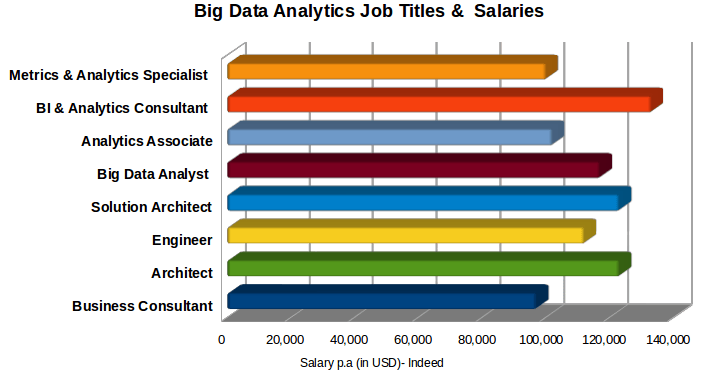
According to the ‘Peer Research – Big Data Analytics’ survey, it was concluded that it is one of the top priorities of the organizations participating in the survey as they believe that it improves the performances of their organizations.
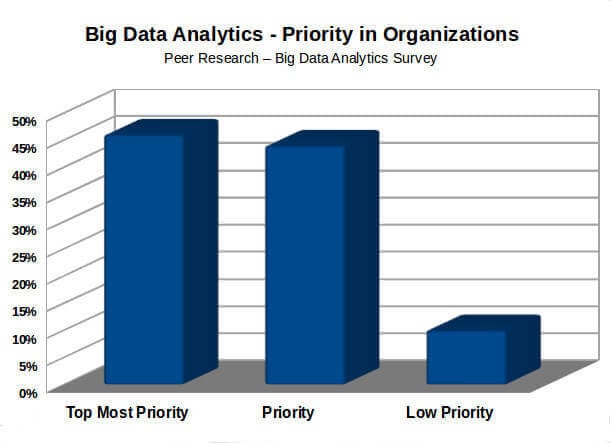
Based on the responses, it was found that approximately 45% of the surveyed believe that Big Data analytics will enable much more precise business insights, 38% are looking to use Analytics to recognize sales and market opportunities. More than 60% of the respondents are depending on Big Data Analytics to boost the organization’s social media marketing abilities. The QuinStreet research based on their survey also back the fact that Analytics is the need of the hour, where 77% of the respondents consider Big Data Analytics a top priority.
A survey by Deloitte, Technology in the Mid-Market; Perspectives and Priorities, reports that executives clearly see the value of analytics. Based on the survey, 65.2% of respondents are using some form of analytics that is helping their business needs. The image below clearly depicts their attitude and belief towards Big Data Analytics. Learn more about Big Data and its applications from the Azure Data Engineering Course in India.
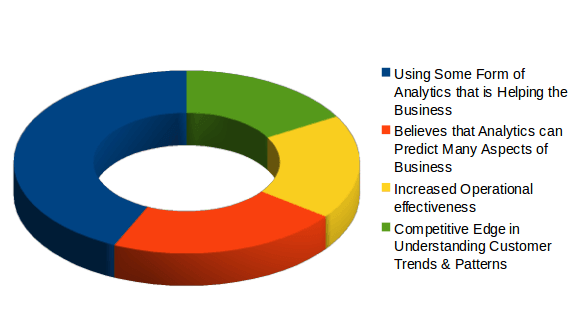
New technologies are now making it easier to perform increasingly sophisticated data analytics on a very large and diverse datasets. This is evident as the report from The Data Warehousing Institute (TDWI) shows. According to this report, more than a third of the respondents are currently using some form of advanced analytics on Big Data, for Business Intelligence, Predictive Analytics and Data Mining tasks.
With Big Data Analytics providing an edge over the competition, the rate of implementation of the necessary Analytics tools has increased exponentially. In fact, most of the respondents of the ‘Peer Research – Big Data Analytics’ survey reported that they already have a strategy setup for dealing with this tool. And those who are yet to come up with a strategy are also in the process of planning for it.
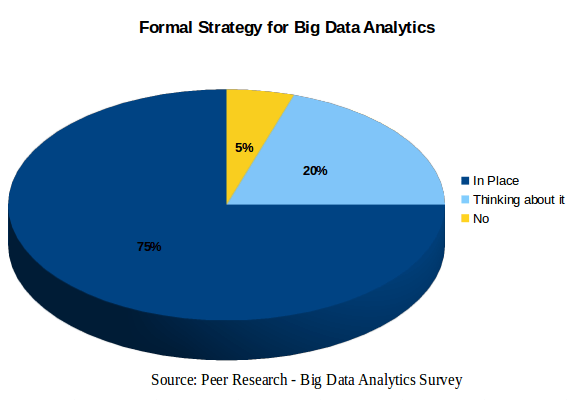 When it comes to this tools, the adoption of Apache Hadoop framework continues to be the popular choice. There are various commercial and open-source frameworks to choose from and organizations are making the appropriate choice based on their requirement. Over half of the respondents have already deployed or are currently implementing a Hadoop distribution. Out of them, a quarter of the respondents have deployed open-source framework, which is twice the number of organizations that have deployed a commercial distribution of the Hadoop framework.
When it comes to this tools, the adoption of Apache Hadoop framework continues to be the popular choice. There are various commercial and open-source frameworks to choose from and organizations are making the appropriate choice based on their requirement. Over half of the respondents have already deployed or are currently implementing a Hadoop distribution. Out of them, a quarter of the respondents have deployed open-source framework, which is twice the number of organizations that have deployed a commercial distribution of the Hadoop framework.
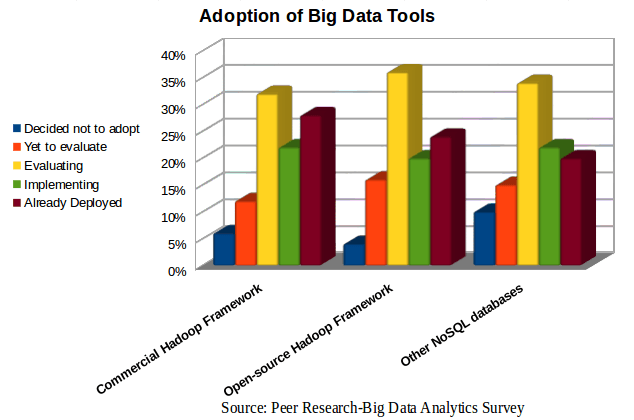
Analytics is a key competitive resource for many companies. There is no doubt about that. According to the ‘Analytics Advantage’ survey overseen by Tom Davenport, ninety six percent of respondents feel that analytics will become more important to their organizations in the next three years. This is because there is a huge amount of data that is not being used and at this point, only rudimentary analytics is being done. About forty nine percent of the respondents strongly believe that analytics is a key factor in better decision-making capabilities. Another sixteen percent like it for its superior key strategic initiatives.
Even though there is a fight for the title of ‘Greatest Benefit of Big Data Analytics’, one thing is undeniable and stands out the most: Analytics play an important role in driving business strategy and making effective business decisions.
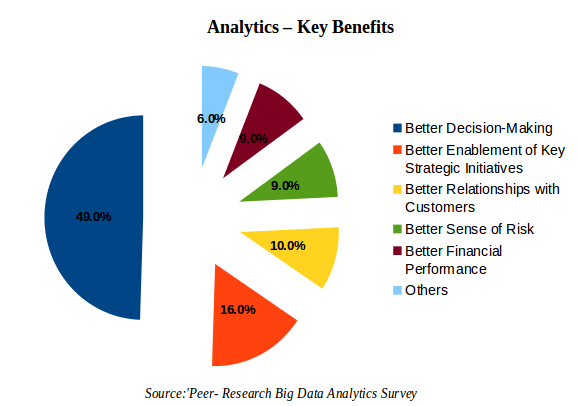
Seventy Four percent of the respondents of the survey report have agreed that it is adding value to their organization and allows vital information for making timely and effective business decisions of great importance. This is a clear indicator than Big Data Analytics is here to stay and a career in it is the wisest decision one can make.
The ‘Peer Research – Big Data Analytics’ survey clearly reports that there is a huge growth when it comes to unstructured and semistructured data analytics. Eighty four percent of the respondents have mentioned that the organization they work for are currently processing and analyzing unstructured data sources, including weblogs, social media, e-mail, photos, and video. The remaining respondents have indicated that steps are being taken to implement them in the next 12 to 18 months.
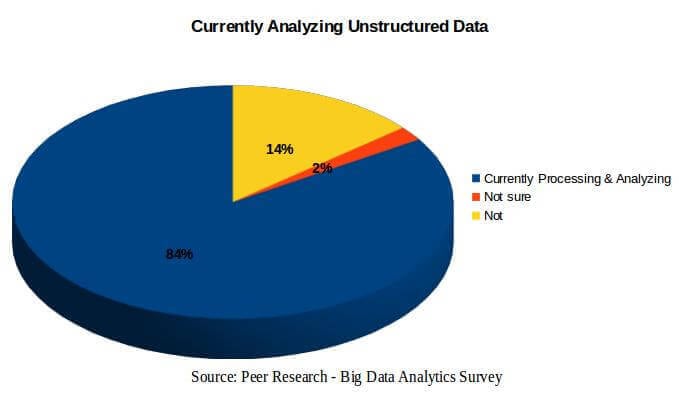
It is a given that there is a huge demand for Big Data Analytics owing to its awesome features. The tremendous growth is also due to the varied domain across which Analytics is being utilized. The image below depicts the job opportunities across various domains.
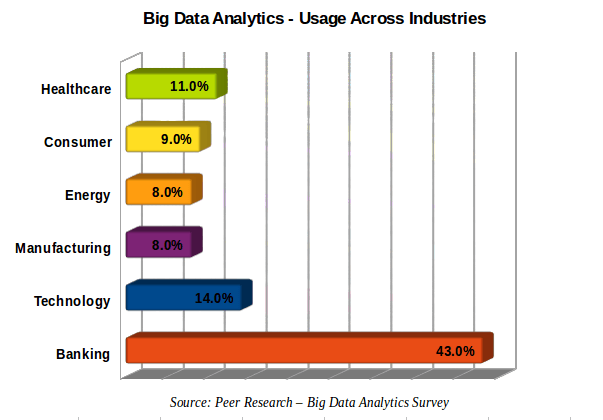
If you also want to learn Big data and make your career in it then I would suggest you must take up the following Big Data Architect Certification.
Big Data Analytics has topped a survey carried out by Nimbus Ninety, as the most disruptive technologies that will have the biggest influence in three years’ time. Added to this, there are more market forecasts that support this:
The Big Data Analytics Global Market for Apps and Analytics Technology will grow by 28.2% CAGR, for Cloud Technology will grow by 16.1% CAGR, for Computing Technology will grow by 7.1% CAGR, for NoSQL Technology will grow by 18.9% CAGR over the entire 2015-2020 period.
From a career point of view, there are so many option available, in terms of domain as well as nature of job. Since Analytics is utilized in varied fields, there are numerous job titles for one to choose from.
Big Data Analytics career is deep and one can choose from the 3 types of data analytics depending on the Big Data environment.
A huge array of organizations like Ayata, IBM, Alteryx, Teradata, TIBCO, Microsoft, Platfora, ITrend, Karmasphere, Oracle, Opera, Datameer, Pentaho, Centrofuge, FICO, Domo, Quid, Saffron, Jaspersoft, GoodData, Bluefin Labs, Tracx, Panaroma Software, and countless more are utilizing Big Data Analytics for their business needs and a huge job opportunities are possible with them.
Analytics no matter how advanced they are, does not remove the need for human insights. On the contrary, there is a compelling need for skilled people with the ability to understand data, think from the business point of view and come up with insights. For this very reason technology professionals with Analytics skill are finding themselves in high demand as businesses look to harness the power of Big Data. The Edureka’s Data architect course helps learners become expert in HDFS, Yarn, MapReduce, Pig, Hive, HBase, Oozie, Flume and Sqoop using real-time use cases on Retail, Social Media, Aviation, Tourism, Finance domain.A professional with Analytical skills can master the ocean of Big Data with the Big Data Training in Chicago and become a vital asset to an organization, boosting the business and their career.
Edureka has a specially curated Data Analyst Course that will make you proficient in tools and systems used by Data Analytics Professionals. It includes in-depth training on Statistics, Data Analytics with R, SAS, and Tableau. The curriculum has been determined by extensive research on 5000+ job descriptions across the globe.
Got a question for us? Please mention them in the comments section and we will get back to you.
 Thank you for registering Join Edureka Meetup community for 100+ Free Webinars each month JOIN MEETUP GROUP
Thank you for registering Join Edureka Meetup community for 100+ Free Webinars each month JOIN MEETUP GROUPedureka.co
what if we dont like big data, it seems very easy to implement and complex to memoriz ?
Hey Arya, thanks for checking out our blog. You can certainly go with the Big Data career track if your interest lies in that area. It’s not complex if you have the right skills and the interest to acquire the skill. You can check out the course curriculum here: https://www.edureka.co/big-data-hadoop-training-certification. Cheers!
Hi,
I’m a fresher and searching for a job.I know SQL queries and core JAVA.Now i’m planning to do a course
so which course will be suitable for me??
Hey Raj, thanks for checking out our blog. If you are interested in making a career in Big Data then your skills are right for learning Hadoop. You can check out our Hadoop course curriculum here: https://www.edureka.co/big-data-hadoop-training-certification. While it will be a great skill addition to your resume, some industry experience would be helpful while looking for Big Data / Hadoop-related jobs. Hope this helps. Cheers!
Hi sir,
I am just 2016 passout. I am under confusion which field i have to choose because i know Sql queries,c programming and some Linux Commands.what i have to do now??
+misaw, thanks for checking out our blog. We suggest that you review where your interest lies and accordingly train for a career track. This blog will give you an idea about which are the hottest skills in the industry if that is the kind of information you are looking for: https://www.edureka.co/blog/10-hottest-tech-skills-in-2016/. Since you have SQL knowledge, you could consider learning Hadoop if Big Data career is what you seek. You can check out our Hadoop training here: https://www.edureka.co/big-data-hadoop-training-certification. Hope this helps. Cheers!
helo evryone ,
I have experience in tech support for 14 months
I would like to get into this data field ?
Which has to be done preferrably ?
Thanks
Hi, we can definitely help you there. Big Data / Hadoop as a career track is recommended for professionals from the same domain having Basic knowledge on Java or Pl-SQl. But, if you are really interested in up-skilling for Big Data, you could start with learning Core Java and then progress onto Hadoop. You can check out our courses here: https://www.edureka.co/. Do feel free to write to us if you have any other questions. Hope this helps. Cheers!
Hi I want join big data analyst course….please suggest me…M completed tech in 2014… Prchby@gmail.com
+peiy, thanks for checking out our blog. We have forwarded your query to the relevant team. They will get in touch with you within 24 hours. Cheers!
I have 8.2 years of experience and all of it is in mainframe technologies. I am looking for a job change but I don’t want to continue on mainframes.
I have few questions
1. I don’t have any experience of Java. How difficult it could be to learn Big Data with zero experience of Java?
2. Out of 10 job openings, I see 5-6 requirements mentioning Java experience too. How to widen my scope in such a case?
Hey Vicky, thanks for checking out the blog. We can definitely help clear your confusion. Knowledge of Core Java and SQL will be beneficial, but certainly not a mandate. Edureka offer you a complimentary self-paced course on Java essentials for Hadoop when you enroll in the Big Data Hadoop Certification course. So you don’t need to worry. You can check out this blog https://www.edureka.co/blog/do-you-need-java-to-learn-hadoop to learn more about this. Please share your contact details if you would like us to call and advise you further. Cheers!
I have done BE in IT. I want to build career in big data field. Need your help.
Contact Details : bkarlekar@gmal.com
+Bramha, thanks for checking out the blog. We have forwarded your query to the relevant team. They will get in touch with you within 24 hours. Cheers!
hello,
i am working as a software engineer in big MNC but i don’t like do coding as much, i love administration work , also work with linux , so is it right decision to choose “Hadoop” as my next career path?
Hey Chirag, thanks for checking out our blog. Hadoop Administration is a right career choice for you, as there is not much coding is required (coding is involved in Hadoop developer course i.e Big Data and Hadoop and that is for developers). Hadoop Administration is also beneficial for professionals from Linux Background. You can check out our Hadoop Administration course details here: https://www.edureka.co/hadoop-administration-training-certification. Hope this helps. Cheers!
Hii…
I am a fresher and currently learning core java as well as oracle and I am planning to learn hadoop also. So is there any scope for freshers in hadoop??? Please suggest…
Hey Rahul, thanks for checking out our blog. Hadoop is generally not suggested for freshers. It is best suited for professionals from the same domain having basic knowledge of Java or Pl-SQl. But, nevertheless, you could work towards getting acquainted with Hadoop in preparation for the future. Hope this helps. Cheers!
nice material